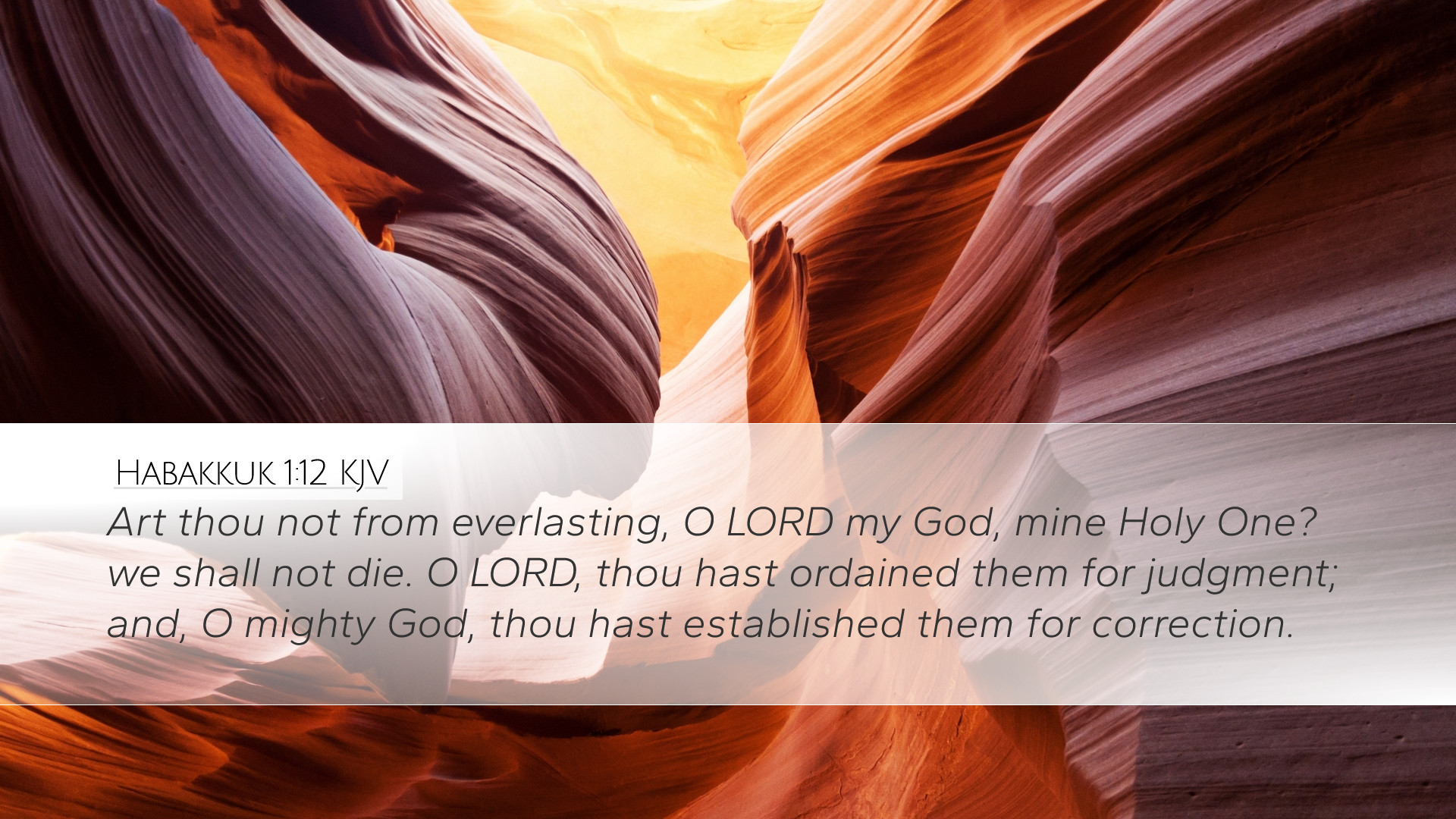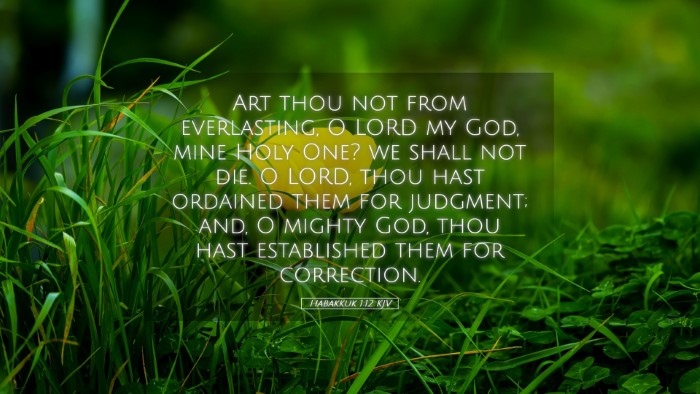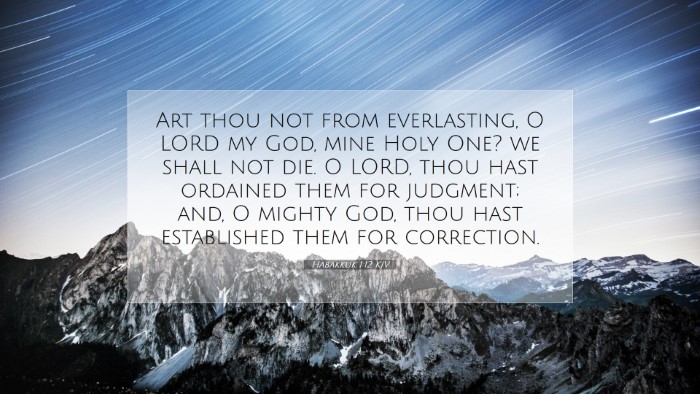Old Testament
Genesis Exodus Leviticus Numbers Deuteronomy Joshua Judges Ruth 1 Samuel 2 Samuel 1 Kings 2 Kings 1 Chronicles 2 Chronicles Ezra Nehemiah Esther Job Psalms Proverbs Ecclesiastes Song of Solomon Isaiah Jeremiah Lamentations Ezekiel Daniel Hosea Joel Amos Obadiah Jonah Micah Nahum Habakkuk Zephaniah Haggai Zechariah MalachiHabakkuk 1:12
Habakkuk 1:12 KJV
Art thou not from everlasting, O LORD my God, mine Holy One? we shall not die. O LORD, thou hast ordained them for judgment; and, O mighty God, thou hast established them for correction.
Habakkuk 1:12 Bible Commentary
Commentary on Habakkuk 1:12
Verse Context: Habakkuk 1:12 reads, "Art thou not from everlasting, O Lord my God, mine Holy One? we shall not die. O Lord, thou hast ordained them for judgment; and, O mighty God, thou hast established them for correction."
Introduction
In this poignant verse, Habakkuk addresses God with deep theological reflection and personal anguish. His questions and affirmations serve as a framework for understanding God’s eternal nature and divine purposes. This commentary synthesizes insights from esteemed public domain theologians to draw out the richness of Habakkuk's thoughts.
Divine Eternity and Holiness
Matthew Henry highlights the significance of the title "everlasting" as it pertains to God's nature. God is presented as the eternal, unchanging sovereign, who exists outside of time and human circumstance. Henry emphasizes that this attribute assures believers of God's constant presence and faithfulness.
Additionally, Albert Barnes reflects on the phrase “my God, mine Holy One.” This personal connection indicates not just a general acknowledgment of God's holiness, but an intimate relationship between the prophet and divine holiness. He points out that holiness signifies God’s moral purity and His commitment to justice, thus setting a precedent for the divine purpose woven through the narrative.
The Assurance of God's People
In Habakkuk's claim, “we shall not die,” there is an assertion of faith in God's promises. Adam Clarke notes that this statement is rooted in covenant theology—the promise of preservation for the faithful, even in the face of judgment. Clarke elaborates that while Israel faces impending doom, Habakkuk's faith rests on God's enduring mercy and covenant. This illustrates a profound understanding that through judgment comes refinement and an eventual restoration.
The Purpose of Divine Judgment
Henry elaborates on the dual nature of judgment as a means of correction and purification. He states that God often employs nations to enact judgment, which not only serves to discipline the wayward but also reveals God’s sovereignty over history. As such, the Chaldeans, though wicked, are instruments of God's righteous will to correct the waywardness of Israel.
Barnes adds that the phrase, “thou hast ordained them for judgment,” underscores the idea that there is a divine purpose in the rise of the Chaldeans. Their appointment as an instrument of judgment emphasizes God's control over global movements. Moreover, this aligns with the prophetic tradition which often reflects on the interplay of divine sovereignty and human moral agency.
God's Might and Human Despair
Clarke observes the tension present in Habakkuk's prayer—the acknowledgment of God's might against the despair of impending judgment. Habakkuk’s lament reflects a heartfelt struggle: How can a righteous God employ an evil nation for His purposes? Here, Clarke suggests that this tension highlights the complexity of faith in the midst of apparent contradiction.
Theological Reflections
The richness of Habakkuk 1:12 provides ample ground for theological discussion:
- The Nature of God: God’s eternality affirms that He exists outside of human history while being involved in it.
- Human Relationship with the Divine: The address "my God" denotes both a community and individual relationship with the Lord, offering a model for believers who grapple with their situations.
- The Role of Judgment: This verse invites a discussion on the purpose of God's judgment—it is not merely punitive but serves a corrective function, seeking reconciliation and holiness.
- Mystery of Providence: Habakkuk exemplifies the human struggle with understanding providence; believers are reminded that God’s ways often transcend human understanding.
Conclusion
Habakkuk 1:12 encapsulates the profound dialogue between faith and doubt. Through the insights of Henry, Barnes, and Clarke, it becomes evident that this verse serves as a testament to the tension of trusting an eternal God who uses imperfect means to bring about His perfect ends. For pastors, theologians, and students, this verse and its commentary resonate with the persistent human inquiry into justice, faithfulness, and the character of God amidst life's disparities.


